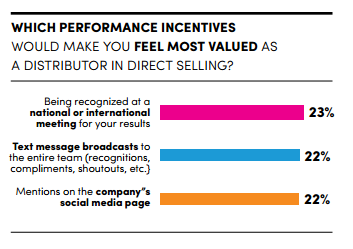Actionable insights and opportunities from the first-ever direct selling generational engagement study.
Direct selling has become an increasingly popular avenue for individuals to start their own businesses and earn income. To gain a comprehensive understanding of the perceptions surrounding direct selling, the Direct Sales Generational Engagement Study was conducted by Bridgehead Collective and carried out by The Center for Generational Kinetics, led by President Jason Dorsey.

In this first-of-its-kind study, Bridgehead Collective chose to partner with the Center for Generational Kinetics, which has led more than 100 research studies in all major industries. Their seminal annual study, The State of Gen Z, formed the basis for the best-selling book, ZConomy and has been consistently featured in national and global media including The Wall Street Journal, New York Times, CNN and many more.
I set out to discover America’s perceptions of entrepreneurship, the gig economy and—more pointedly—direct selling. Statistical significance was of ultimate importance in this analysis, so the study represents a wide-sweeping sample that is reflective of America, with an equitable mix of genders, demographics, employment status, education levels and location that allows for a 97 percent confidence level. This study aimed to explore the attitudes, motivations, limitations and beliefs about starting a business in America, as well as uncover perceptions of direct selling, recruiting strategies, onboarding methods, distributor retention and preferred payment structures.
We designed the study to provide actionable insights across 10 key categories:

- Perception of Industry and Channel
- Recruiting and Prospecting
- Motivations and Decision Criteria
- Onboarding and Getting Started
- Training
- Compensation and Value Proposition
- Recognition
- Incentive Trips and Events
- Retention
- Duplication and Role of Team Building
In this series, we are digging deeper into each of these categories, focusing this month on all things related to Recognition.
Last month highlighted one of the more shocking findings of the study related to compensation—particularly how we market and present the “size” of the income opportunity. The most critical actionable insight was that when it comes to compensation, you really need to have targeted messages depending on your audience as not only do you risk not appealing to the right generation, but there is significant risk associated with turning them off irreparably.
When it comes to recognition, the consequences of “getting it wrong” might not be so dire, but this category represents MASSIVE upside when we can get it right. Interestingly, the differences between men and women were just as stark as the differences between generations.
But let’s start with what we mean when we talk about “Recognition.” For the purposes of this study, recognition was really explored under the umbrella of “Motivations.” Meaning, we examined all the programs, communication, celebration and incentives that would most likely resonate for direct sellers to join, stay and thrive with direct selling companies.
The ultimate goal here was to divine what specific things we could employ to help each generation maximize our compensation plans by moving up in leadership and improve retention by having a cohesive, aligned set of programs and incentives that all work together to inspire your sellers to keep going.
If you follow this series or my podcast, you know how passionate I am about retention, often referring to it as the holy grail of our industry. Turns out, this study revealed all kinds of insights that we have been helping companies employ to specifically drive retention (with awesome results, BTW!).
The Gifts that Keep on Giving
The way we phrased the first question speaks to this retention issue. We asked all participants:
What would absolutely convince you to stay at a direct selling business after the first three months?
This question served two purposes, and we covered some of the results in our last installment about compensation. As you may remember…the first answer was definitely crafted by Captain Obvious himself (we’re all pretty sure he’s a guy, right?). Number one answer on the board—with 55 percent ranking it as their #1 answer—getting paid.

Repeat after me: duh!
But starting with the second answer things start to get REALLY interesting.
For Gen Z, the belief that they are part of a cause or a company that is creating change in the world would “absolutely convince” them to stay with a company. Absolutely convince. And this is in their FIRST THREE MONTHS.
Now, I can already hear so many of you saying to yourselves…believe in a cause? That’s not recognition. That’s an entirely different segment of our events. That’s not even part of the sales and recognition team.
Precisely. But perhaps it should be.
As we move to the Action Item portion of the article, here is your first Action Item. Since I feel like we are having a conversation now, I know what you’re thinking: ”Heather, wasn’t this very thing an action item last month? Didn’t you already advise us to tell our charitable story early, proudly and often?”
Yes. Yes, I did. That should tell you how powerful this topic is…it makes the action list for MULTIPLE categories.

Action Item: Completely rethink the role that your mission and charitable cause has in your field recognition program, making your field leaders the hero of the story, not the company.
What do I mean by that? So many of us talk about our cause, our mission, our impact, our accomplishments that we are making as a way of touting the company. Making sure we are telling others how amazing “the company” is.
What if we flip that script? What if the impact that we are making is instead framed through the lens of our field leaders. What THEY are doing to effect change. How many children THEY have fed. How many carbon units THEY have offset. How many bottles THEY have kept out of landfills. How many natural disaster victims THEY have helped.
What if we sent them a snapshot each year, Spotify Wrapped style, that pulled their specific stats and showed them the difference they were making in the world? What if that was one of your recognition categories on your monthly conference calls, social posts and annual events?
If you are targeting Gen Z or Younger Millennials, you may be incredibly surprised at the loyalty, passion and energy this change can make. And when it comes to retention—nothing is stickier than the belief that YOU matter.
Be Better, Not Boring
When you look at some of the more traditional elements of recognition that we employ in our companies, the bottom line is that most of the historical ways we recognize people, the next generations find…well…boring.

Less than 25 percent of Gen Z and Younger Millennials said that “Mentions on the Company Social Media Pages” or “Being Recognized at a Regional or National Event” would make them feel valued.
That’s not a lot, given how much time energy and expense we put into all of those…especially event recognition. So, if the question is “why,” the answer is two-fold.
One, it’s just not as cool as it once was. The next generations are increasingly looking for things that benefit their families; their communities; and the lives they are building. They are not looking externally for affirmation nearly as much as the older generations. As a commentary on society, awesome! But this shift certainly requires a few pivots as far as our recognition budgets are concerned.
But what’s the second reason? How Insta-Worthy the experience is! The what-used-to-be-ubiquitous pictures on social from all our events: walking across stage; waving flags; getting jewelry, flowers or whatever else—feel like relics from another era. What used to be Facebook fodder is considered cringeworthy by younger generations.

What do they want instead? Experiences. Moments. Magical moments that elevate their personal brand. They want to expose their community of followers to things they haven’t seen; places they haven’t been; and experiences they haven’t had.
We see that from the anecdotal comments from the study as well as the data. The study showed that two of the top three things that would make younger generations feel valued:
- Getting to Go on a Trip to Somewhere Fun and Bring a Guest
- Tickets to Events or Experiences (Concerts, Sporting Events, etc.)
These combined represent the top choice for 69 percent of all generations and 91 percent of Gen Z and Millennials.
Action Item: Scrub those recognition budgets. Reallocate as much as you possibly can to things that are experiential in nature.
So what does that mean in practice? Take a look at all those programs that you have (that used to be super successful) and re-frame them. For example, do you have a “pin program” or something similar where your leaders can earn different rank advancement jewelry, pins, necklaces, watches or jewels embedded in things that denote achievement?

We’ve all been there—and the OGs in our field will never be shy about telling us how much and how hard and how long they worked to get that next thing! Just so they could show it off. But that just doesn’t work anymore. And all too often we feel like these programs are foundational—a part of our culture and history—so it almost feels sacrilegious to think about abandoning them.
It’s not. They were created for a specific moment in time. And they worked. Now they don’t. It’s OK to change.
What if the thing they were working to “complete” or “achieve” were figurative (or literal) passport stamps. How many different states can they earn weekend retreats in? How many different countries can they see because of your company? How many different concerts? Super Bowls, the World Series…whatever it is…keep the “collection” in place—just swap out the elements for things that will resonate even more with today’s seller. And worried about those events? Still recognize…but highlight those achievements instead.
The love language of the younger generation is firmly rooted in experiences. Experiences that enrich their lives and—most importantly—that photograph beautifully. Because if you can’t share it on Instagram…did it really happen?
So that covers the first part of recognition and what makes tomorrow’s sellers feel valued, celebrated and will make them want to stay forever. Please look out for the next article where we jump into all things promotional. What works? What doesn’t? How much is too much? Each generation, as they say, has big feelings on this issue. Can’t wait to share them with you.
WANT TO KNOW HOW ATTRACTIVE YOUR COMPANY IS TO EACH GENERATION? Schedule your Generational Attraction Assessment today, complimentary for DSN Gold and Platinum Supporters.

With 20+ years of cross-functional experience in direct selling, Heather Chastain brings a solid understanding of sales, marketing, technology, manufacturing, operations and C-Suite challenges as well as a strong collaborative and relational style of leadership to the table. Heather has held executive roles at Shaklee, Arbonne International, Celebrating Home and BeautiControl. Heather also serves as the Strategic Advisor at DSN and is the Founder & Chief Executive Officer of Bridgehead Collective.
From the January/February 2024 issue of Direct Selling News magazine.


